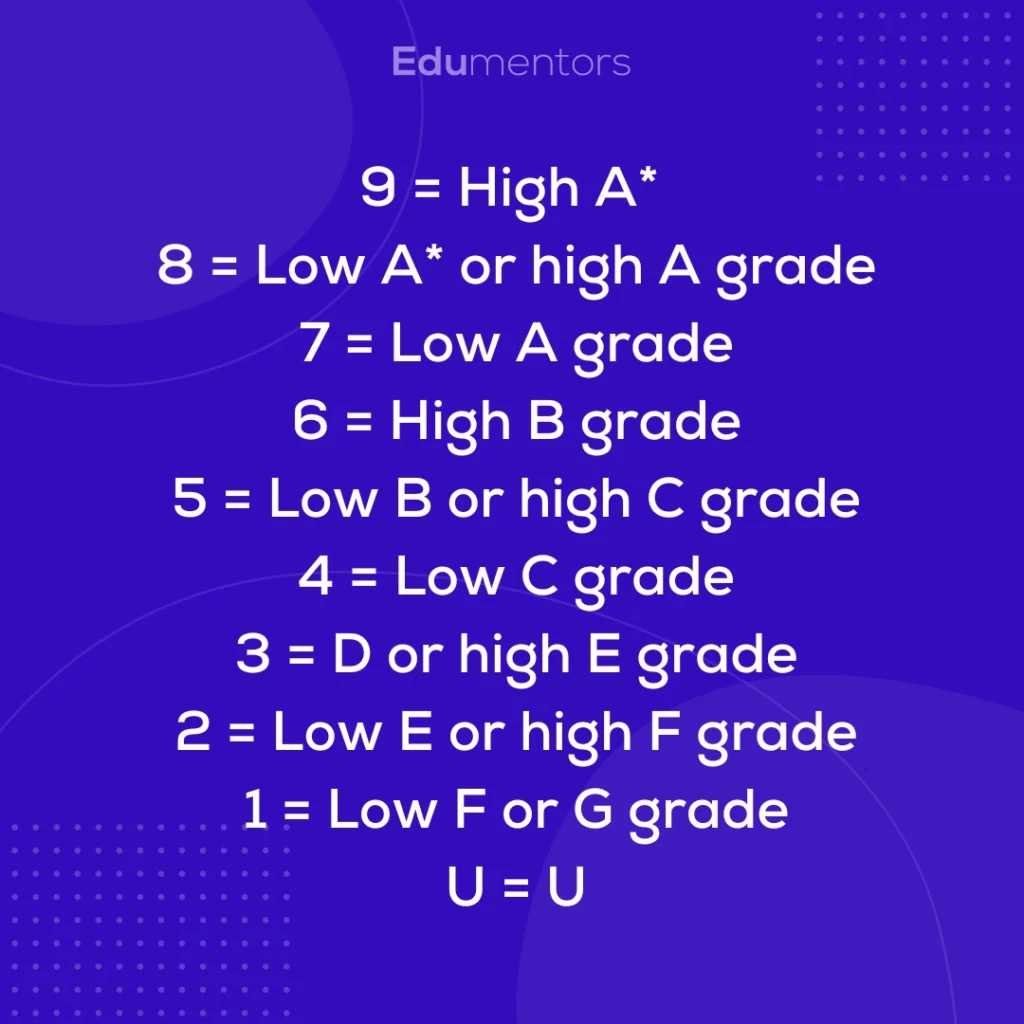Let’s Start with Basics – What is a GCSE Exam?
GCSE exams were introduced in 1986. Before that, qualifications like CSEs, O-Levels and GCEs were used to depict the level of knowledge in a subject. Even though GCSEs existed for years, exams and grading systems change and evolve.
GCSE exam is the most common type of qualification in the UK with approximately 5 million people taking them each year. it’s studied by students who want to go on to higher education or get jobs after leaving school.
Which Year is GCSE?
Depending on the schools, students start studying for the GCSE exam in year 9 or year 10. The exams are taken in year 11, at the end of the GCSE course.
Can You Take GCSE in Year 11?
Yes. Students can take GCSEs in Year 10. Some schools offer the option to sit these exams early, particularly in subjects where students are strong. Early completion of GCSEs can provide more time in Year 11 for focusing on other subjects, retaking exams, or engaging in extracurricular activities. It can also boost confidence and motivation for future academic challenges.
What Does GCSE Stand For?
A GCSE stands for General Certificate of Secondary Education (GCSE). The word “general” means that this qualification covers more subjects than other types of diplomas like A-levels or vocational qualifications such as apprenticeships.
The GCSE system aims to provide a balanced education that equips students with foundational knowledge and skills, while also offering the flexibility to explore subjects that interest them. This makes GCSEs a versatile qualification that can lead to a wide range of educational and career paths.
Mandatory Subjects in GCSE Exams
There are mandatory subjects all students must take – English Language, Maths and Science. Other than that, it depends on what you want to do in the future.
Over the years, they added subjects, altered existing subject exam formats and changed the grading system.
Can You Take GCSE Exams Independently?
The Short Answer
Yes, you absolutely can! Unlike some other qualifications, there are no prerequisites or formal entry requirements for taking GCSEs. As a private candidate, all you need to do is register on time and pay the necessary fees.
Finding an Exam Centre
You won’t be short of options when it comes to finding a local exam centre, which will likely be a college or school in your area. To search for exam centres, you can use the search tools on the following exam boards’ websites:
Top Tip: We highly recommend booking your exam several months in advance. This will increase your chances of securing a spot at your preferred centre.
How Much Does GCSE Exams Cost?
The cost of taking a GCSE exam can vary considerably depending on both the subject and the exam centre you choose. Fees can range from £15 to £200. To get an accurate idea, it’s best to make a shortlist of local centres and contact them directly for their pricing information.
What You’ll Need for Registration
When registering, the exam officer will require the following information:
- Full Name: Must be verified by identification
- Date of Birth: Also needs to be verified by identification
- Address
- Contact Details
- UCI (Unique Candidate Identifier): If you’ve previously sat exams in the UK, this identifier will be on your certificates. If not, don’t fret—the exam board will assign you a new one.
How Should You Choose GCSE Subjects?

📌 How Many GCSEs Should You Take?
The minimum number of subjects you should take is 5 and you can take up to 16 GCSEs, but it will be close to impossible to do well in every subject. On average, people take 9 GCSE subjects.
📌 How Many GCSEs Do You Need?
The number of GCSEs you need varies based on your goals and the requirements of future educational paths. While the minimum is usually 5 subjects, most students take an average of 9. Make sure to consider both mandatory and elective subjects based on your interests and aspirations.
📌 Ensure You Pick Subjects You are Good at
It is important to select a subject that you will enjoy. If you find a subject difficult, then you may not be able to put the effort into getting good grades since it’s easy to get discouraged by some people.
Make sure that if there are subjects that interest you, then take them on as part of your GCSE coursework. You should also try completing some projects which require more time than others in order to gain an understanding of the critical areas covered by each coursework topic or unit. This may help aid understanding at higher levels when studying these topics at A level later on down the line. Hence, it’s worth investing some time into understanding them now!
📌 Hardest GCSE Subjects
- Physics.
- English Literature.
- Maths.
- Computer Science.
- Economics.
- Biology.
- English Language.
- Modern Foreign Languages.
📌 Easiest GCSE subjects
- Geography.
- Film Studies.
- Religious Studies.
- Media Studies.
- Hospitality and Catering.
- Business Studies.
- Drama.
- Physical Education.
📌 Consider Your Future Goals and Career Paths
You need to think about what future goals you want to achieve, and how these can be achieved through your chosen GCSEs. For example, if you’re planning on studying medicine at university, then it makes sense that subjects such as biology and chemistry would help prepare you for this career path. If instead, you’re interested in becoming a teacher or social worker (or even an engineer), then subjects such as history and geography may be more useful for this purpose than maths or science alone could ever be.
📌 Ask for Advice from Others
You can also ask for advice from your teachers or tutors. Your teachers will be able to give you a better idea of what subjects they recommend, as well as their reasons for doing so (e.g., if a teacher has had previous experience with other students similar to you). If you’re unsure about whether or not a particular subject is suitable for you, ask them! It may help clear up any doubts that have been building up inside your head.
Your head teacher will also be able to offer some insight into which subjects are popular at school and why they might be popular; this information can help narrow down the list of options available to choose from when making decisions about GCSE choices later down the line!
📌 Avoid Choosing too Many Subjects
The number of subjects you take is up to you. But if you take too many, it may be difficult to get a good grade in all of them. You will have to sacrifice some of your grades and choose which ones are most important for your future college or university pathway. You may also have trouble with time management and feel overwhelmed. Be careful with assessing your abilities since this can seriously damage both your grades and social life!
If you are still unclear about what subject to choose, read these 5 tips for choosing your GCSE subjects.
GCSE Grading System – GCSE Grade Boundaries

The Old GCSE Exam Grading System: A* to U
Before 2017, GCSE grades were awarded using an alphabetical scale that ranged from A to G for passing grades, and U for “unclassified,” meaning the candidate did not qualify for a certificate. Initially, the scale only extended from A to G. However, to distinguish exceptionally high performance, an A* grade was later introduced. Under this system, grades A, B, and C were generally considered passing grades and were sufficient for entry into most universities or employment opportunities.
The New GCSE Exam Grading System: 9 to 1
In 2017, the grading system underwent a significant overhaul, transitioning to a numerical scale of 9-1. Under this system, 9 is the highest grade achievable, and 1 is the lowest. A grade of 4 is considered a pass in every subject.
Why Did the GCSE Exam Grade Boundaries Change?
The shift to the 9-1 grading system was not merely cosmetic; it was designed to provide a more nuanced understanding of a student’s ability in a particular subject. This new scale allows for greater differentiation between good and less-than-ideal performance, making it easier for universities and employers to assess a candidate’s proficiency more accurately.
How Important are GCSEs?
GCSEs and Sixth Form Entry – Minimum Requirements
Yes, GCSEs are indeed crucial, especially when it comes to gaining admission to a sixth form college. Most institutions have specific GCSE grade requirements, particularly for the subjects that students wish to study at A-level. Strong GCSE performance can therefore not only influence which sixth form you attend but also which A-level subjects you can choose. Some sixth forms even use GCSE grades to predict a student’s likely success at A-level, making them an essential part of the admissions process.
However, it’s worth noting that the emphasis placed on GCSEs can vary among different sixth forms. Some may look at other factors such as overall academic trajectory, personal growth, extracurricular achievements, and a demonstrated interest in the chosen subjects.
Alternative Educational Paths
While GCSEs have traditionally been the cornerstone of secondary education, there are also other viable educational paths. Apprenticeships, vocational training, and BTECs are options that offer practical experience and can lead to employment or further studies. For students who excel in hands-on environments or have a specific career path in mind, these options might be more suitable. Nonetheless, core subjects like English and Mathematics retain their universal importance, even in these alternative settings.
University Applications – Do Universities Care About GCSE Grades?

The importance of GCSEs in university applications can vary significantly depending on the institution and course. While some universities undertake a holistic evaluation—considering A-levels, personal statements, references, and extracurricular activities—others may place a heavier emphasis on GCSE grades. Elite universities, in particular, may give considerable weight to GCSE performance as an indicator of academic ability. However, universities are increasingly seeking well-rounded applicants, so strong GCSE results, although beneficial, are not the sole determining factor.
What Happens if I Miss a GCSE?
There are instances where unforeseen circumstances might prevent you from taking a GCSE exam as planned. Below are some of the most common reasons and what to do about them.
Health Issues – What Happens If You are Sick on a GCSE Exam Day?

Health is unpredictable. If you find yourself unable to attend the exam due to sudden illness, it’s crucial to get a medical certificate as soon as possible. The certificate should be from a registered medical practitioner, stating that you were unfit to sit the exam. Submit this to the exam board through your school as evidence for your absence. Depending on the severity and duration of your illness, you may be able to reschedule the exam or your previous coursework might be taken into consideration for your final grade.
Severe Weather Conditions – What If There’s a Storm on a GCSE Exam Day?

Severe weather can pose a significant obstacle to getting to the exam centre. In cases where severe weather conditions are anticipated, it’s wise to stay updated via your school’s communication channels. Exam boards may reschedule, and your school will typically guide you through this process.
Being Late – What If I’m Late for My GCSE Exam?

Unforeseen circumstances like traffic jams or public transport delays can make you late for the exam. If you’re only slightly late, you may still be allowed to take the exam, although you won’t be given extra time. Being excessively late usually means you won’t be allowed to sit the exam at all. In such instances, you may have to take the exam at a later date, if that option is available.
Special Considerations and Alternatives
Some students may qualify for special considerations due to extenuating circumstances like a recent bereavement or ongoing medical conditions. If you think you may qualify, consult with your school and submit any necessary documentation well in advance of the exam date.
In situations where taking the GCSE exam becomes impossible due to any of these reasons, alternative assessments may be considered. These could include oral exams, project-based assessments, or taking the exam at a later date.
Do You Get Fined for Missing a GCSE?
It depends on the specific reason for your absence. If you have a valid reason for missing the GCSE exam, such as illness or a family emergency, you will not be fined. However, if you miss the exam without a valid reason, you may be fined. The amount of the fine varies from school to school, but it is typically between £10 and £20.
How Should You Prepare for GCSE Exams?
If you’re looking to get the best possible results, then it’s important that you have a clear plan of action. You need to know what your strengths and weaknesses are and the goals that you want to achieve.
- Create a realistic study schedule
- Use GCSE books and resources on the internet – there are many videos that may help you.
- Try different studying techniques – you may find something that will change your life! Experiment, try them out, you have time!
- Get help from an online tutor for additional guidance on how to prepare for the exams, or find a local private tutor who can help you through it all.
- Start studying early – there is no time for procrastination.
How to Revise for GCSEs?

📌 How Early Should You Start Revising?
If you want to succeed in your GCSEs, it’s important to start revising approximately 6 months before the exam. The earlier you start revising for the exams and the more time you spend on revising a day, the more comfortable and confident you will feel when sitting them.
📌 How Much Revision a Day?
It is also recommended that students should aim for around two hours of revision per day. However, some students may prefer to revise for longer periods of time or less frequently than this amount. Whatever works best for your individual circumstances will be right for you!
📌 Revision Methods
The key thing here is that whatever method of revision works best for YOU – will be most effective, whether this means doing all of your work at once (which can sometimes be stressful), breaking down each section into smaller chunks throughout the day or even taking breaks between sections – do whatever makes sense depending on what works best with YOUR schedule/life situation etcetera. Check out the top 7 revision methods and try the ones you like.
GCSE Exam Dates 2025
When do GCSEs start and Finish
GCSE exam timetables are already out for 2025. Exams across all major boards – AQA, Edexcel, OCR – start on May 9th and conclude by June 19th.
GCSE Maths Exam Dates 2025
| Paper Number | AQA | OCR | Pearson Edexcel | WJEC Eduqas | |
|---|---|---|---|---|---|
| GCSE Maths Foundation | Paper 1 | Thursday 15 May | Thursday 15 May | Thursday 15 May | Thursday 15 May |
| Paper 2 | Wednesday 4 June | Wednesday 4 June | Wednesday 4 June | Wednesday 4 June | |
| Paper 3 | Wednesday 11 June | Wednesday 11 June | Wednesday 11 June | Wednesday 11 June | |
| GCSE Maths Higher | Paper 4 | Thursday 15 May | Thursday 15 May | Thursday 15 May | - |
| Paper 5 | Wednesday 4 June | Wednesday 4 June | Wednesday 4 June | - | |
| Paper 6 | Wednesday, 11 June | Wednesday, 11 June | Wednesday, 11 June | - |
GCSE Physics Exam Dates 2025
| Paper Number | AQA | OCR A | OCR B | Pearson Edexcel | |
| GCSE Physics Foundation | Paper 1 | Thursday, 22nd May | Thursday, 22nd May | Thursday, 22nd May | Thursday, 22nd May |
| Paper 2 | Thursday, 16th June | Thursday, 16th June | Thursday, 16th June | Thursday, 16th June | |
| Paper 3 | - | Thursday, 22nd May | Thursday, 22nd May | - | |
| Paper 4 | - | Monday, 16th May | Monday, 16th May | - | |
| GCSE Physics Higher | Paper 1 | Thursday, 22nd May | Thursday, 22nd May | Thursday, 22nd May | Thursday, 22nd May |
| Paper 2 | Thursday, 16th June | Thursday, 16th June | Thursday, 16th June | Thursday, 16th June | |
| Paper 3 | - | Thursday, 22nd May | Thursday, 22nd May | - | |
| Paper 4 | - | Thursday, 16th June | Thursday, 16th June | - |
GCSE Chemistry Exam Dates 2025
| Paper Number | AQA | OCR | Pearson Edexcel | |
| GCSE Chemistry Foundation | Paper 1 | Monday, 19th May | Monday, 19th May | Monday, 19th May |
| Paper 2 | Friday, 13th June | Friday, 13th June | Friday, 13th June | |
| GCSE Chemistry Higher | Paper 1 | Monday, 19th May | Monday, 19th May | Monday, 19th May |
| Paper 2 | Friday, 13th June | Friday, 13th June | Friday, 13th June |
GCSE Biology Exam Dates 2025
| Paper Number | AQA | OCR A | OCR B | Pearson Edexcel | |
| GCSE Biology Foundation | Paper 1 | Tuesday 13th May | Tuesday 13th May | Tuesday 13th May | Tuesday 13th May |
| Paper 2 | Monday 9th June | Monday 9th June | Monday 9th June | Monday 9th June | |
| GCSE Biology Higher | Paper 1 | Tuesday 13th May | Tuesday 13th May | Tuesday 13th May | Tuesday 13th May |
| Paper 2 | Monday 9th June | Monday 9th June | Monday 9th June | Monday 9th June |
GCSE Combined Science Exam Dates 2025
| Paper Number | AQA | OCR A | OCR B | Pearson Edexcel | |
| GCSE Combined Science Foundation | Paper 1 | Friday 10 May | Friday 10 May | Friday 10 May | Friday 10 May |
| Paper 2 | Friday 7 June | Friday 7 June | Friday 7 June | Friday 7 June | |
| Paper 3 | Friday 17 May | Friday 17 May | Friday 17 May | Friday 17 May | |
| Paper 4 | Tuesday 11 June | Tuesday 11 June | Tuesday 11 June | Tuesday 11 June | |
| Paper 5 | Wednesday 22 May | Wednesday 22 May | Wednesday 22 May | Wednesday 22 May | |
| Paper 6 | Friday 14 June | Friday 14 June | Friday 14 June | Friday 14 June | |
| GCSE Combined Science Higher | Paper 1 | Friday 10 May | Friday 10 May | Friday 10 May | Friday 10 May |
| Paper 2 | Friday 7 June | Friday 7 June | Friday 7 June | Friday 7 June | |
| Paper 3 | Friday 17 May | Friday 17 May | Friday 17 May | Friday 17 May | |
| Paper 4 | Tuesday 11 June | Tuesday 11 June | Tuesday 11 June | Tuesday 11 June | |
| Paper 5 | Wednesday 22 May | Wednesday 22 May | Wednesday 22 May | Wednesday 22 May | |
| Paper 6 | Friday 14 June | Friday 14 June | Friday 14 June | Friday 14 June |
GCSE English Language Exam Dates 2025
| Paper Number | AQA | OCR | Pearson Edexcel | WJEC Eduqas | |
| English Language | Paper 1 | Thursday 23 May | Thursday 23 May | Thursday 23 May | Thursday 23 May |
| Paper 2 | Thursday 6 June | Thursday 6 June | Thursday 6 June | Thursday 6 June |
What Happens if You Fail Your GCSE Exams?
You can always resit the GCSE exam next year. There are no age restrictions or a maximum number of resittings you can do. So, don’t worry, consider your options and prepare for the next year’s exam. You can take GCSE courses at your local college, study online by yourself or hire a tutor for additional help, it’s up to you.
📌 Do Universities Care If You Resit the GCSE Exam?
If you get acceptable grades and meet university requirements, they generally don’t care if you had to resit. They may ask you the reason why you could not get good grades on the first try, but most universities care about your last grade more.
📌 Can You Go to the University If You Fail the GCSE Exam?
Although it will be really hard, yes, you can. Make sure your application stands out, seek extracurricular activities, and show them that you are a good candidate.
You can also take alternate qualifications like functional skills. By passing level 2 functional skills, you can get an equivalent grade to C in GCSEs which is a pass! In addition, it only takes several weeks to complete courses!
Conclusion
So there we have it, a comprehensive look at the ins and outs of GCSEs. From understanding the grading system to recognising the importance these exams hold in your educational journey, it’s clear that GCSEs are more than just a set of grades on paper. They can shape your sixth form experience, influence university applications, and even offer you alternative educational routes to explore.
If you find yourself needing a bit of extra help along the way, don’t fret. That’s where Edumentors comes in. With their team of experienced tutors, they offer tailored support to help you navigate the complexities of GCSE subjects. Whether you need assistance in mastering the periodic table or penning the perfect essay, their tutors can provide the expertise you require to succeed.
Remember, GCSEs are a significant chapter in your education, but they aren’t the entire book. Whichever path you choose, be it traditional or alternative, focus on making the most of the opportunities that come your way. Happy studying!
FAQ
What is the hardest GCSE exam?
The hardest GCSE exam is widely regarded as GCSE Maths, known for its rigorous problem-solving skills and complex concepts. In 2023, statistics highlighted its challenge: out of 761,961 students, only 61.0% passed, with a mere 3.3% achieving the top grade of 9. This reflects its demand for a deep understanding of topics like algebra, geometry, and statistics, making it a significant hurdle for many students.
What are the GCSE exams in the UK?
The GCSE exam is a popular qualification in the UK, taken by around 5 million people annually. It’s for students looking to further their education or start working after school. GCSE means General Certificate of Secondary Education and is respected by schools, colleges, and job places. It mainly focuses on subject theory and investigation, and some areas also require practical tasks.
How many papers do you do in GCSE?
GCSE subjects usually consist of either 2 or 3 papers. This means that for a single subject, students might have to take up to 3 separate exams. Typically, students are required to complete around 18 to 25 exams in total.
Do you do GCSE in year 10?
GCSEs are the primary qualifications taken during Key Stage 4, covering Years 10 and 11, and are meant to be completed over two years. However, some schools may have students finish specific GCSEs in just one year, with exams at the end of Year 10.
Is GCSE year 10 or 11?
GCSEs are typically taken by students in Year 11, which is the final year of Key Stage 4 in the UK education system. Students are usually 15 to 16 years old during this year. However, the preparation for GCSEs often begins in Year 10, when students start to focus more intensively on the subjects they have chosen to pursue for their GCSE examinations.
What dates are GCSE exams 2025?
The GCSE exams for the year 2025 are set to begin in the week starting on Monday, May 5, and will conclude on Wednesday, June 25. These dates are the latest ones given by the exam boards, but they could still change as the exams get closer. Therefore, you and your child should think of these dates as a rough guide for now.
Will GCSE 2025 get formula sheets?
For the GCSE 2025 exams, whether students will be provided with formula sheets depends on the subject. Typically, subjects like Mathematics and Physics provide formula sheets to aid students during their exams. However, the availability of these sheets can vary based on the specific exam board regulations. It’s best to consult the relevant exam board’s guidelines or speak with your school for the most accurate and subject-specific information
What are the 12 GCSEs?
GCSEs cover a broad range of subjects, and students typically study around 8-12 subjects depending on their school curriculum and personal choices. The following are common GCSE subjects that students may take:
- Mathematics
- English Language
- English Literature
- Sciences (Biology, Chemistry, Physics, or Combined Science)
- History
- Geography
- Modern Foreign Languages (e.g., French, Spanish, German)
- Art and Design
- Religious Studies
- Physical Education
- Computer Science
- Design and Technology
This list can vary depending on the student’s school and personal interest, with some students choosing more specialised subjects such as Music, Drama, or Business Studies.
What is a 9 in GCSE
A 9 is the highest possible grade that a student can achieve in the GCSE grading system in England. It is equivalent to a high A* in the old grading system and reflects exceptional performance. The new grading scale, introduced in 2017, ranges from 9 (highest) to 1 (lowest), with a 9 being awarded to the top percentage of students. This change was made to differentiate the most outstanding students and raise academic standards.
when do GCSEs finish 2025
The 2025 GCSE exam season is expected to finish by late June. The exams typically begin in May and continue throughout June, with specific end dates varying based on the subject and exam board. Check with your school or exam timetable for exact dates closer to the exam period.
What are GCSEs equivalent to in America?
GCSEs (General Certificate of Secondary Education) are the academic qualifications typically taken by students aged 14 to 16 in England, Wales, and Northern Ireland. In the American education system, GCSEs are somewhat equivalent to the completion of high school courses taken by students in grades 9 and 10 (freshman and sophomore years).
While the US doesn’t have a direct equivalent to GCSEs since the American high school diploma covers a broader range of subjects over a four-year period, the level of education provided by GCSEs can be compared to the courses leading towards a high school diploma in the US. These are often benchmarked at levels that prepare students for either advanced placements (AP courses) or include standard high school coursework.
What is the German equivalent of GCSE?
The German equivalent of GCSEs (General Certificate of Secondary Education) in the UK is the Mittlere Reife or Realschulabschluss. This qualification is obtained after completing 10th grade at a Realschule in Germany. The Mittlere Reife is considered a medium-level educational qualification that allows students to go on to vocational training, higher secondary education (such as Gymnasium to pursue the Abitur), or directly into employment. Like the GCSEs, it marks the end of compulsory education but provides different pathways for further education or professional training.
What is GCSE in the UK for foreigners?
For foreigners looking to understand the UK education system, GCSEs (General Certificate of Secondary Education) are a set of exams taken by students aged 15-16 at the end of Key Stage 4, usually in Year 11. These are public exams that serve as a standard measure of a student’s proficiency in various subjects ranging from English, Maths, and Sciences to languages and humanities.
GCSEs are crucial because they often determine the academic and vocational pathways available to students post-16, such as progressing to A-Levels, vocational qualifications, or entering employment. For students coming from abroad, these qualifications are often seen as equivalent to their own country’s completion of lower secondary education, and they are a key requirement for those wishing to continue to higher education or more advanced studies in the UK.









